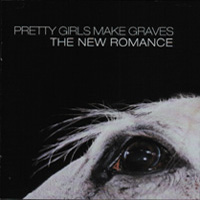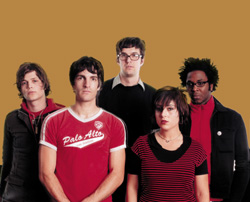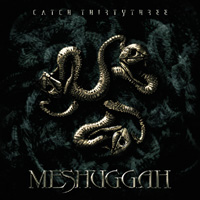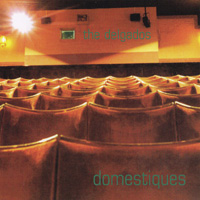 Pretty Girls Make Graves
Pretty Girls Make Graves
The New Romance (Matador)
An interview with Andrea Zollo, Derek Fudesco, Nathan Thelen, Nick Dewitt, J. Clark
by Tim Den
Amidst a disco riot of pelvic-quaking and call-and-responses, Pretty Girls Make Graves burn rubber and all the “ex-members of,” “band with girl singer,” “named after a Morrissey song” crap eat their dust. Ginsu-sharp jabs of wiry chords are twisted into “pop song” format by anchor-steady bass and roomy drums, led by vocalist Andrea Zollo into declaratory anthems without ever looking back. Is that the phantom of DCore (Faraquet, Smart Went Crazy) I sense in the heart of The New Romance? Yes indeed, what with all the cut-up rhythms and emotive hollering, even Guy from Fugazi would gladly flail around to this. Interspersed with electronic interludes and spiced up by the occasional “melodic hook” (be it vocally or from a Rhodes), Pretty Girls Make Graves are urgent punk rockers at heart, contortionists of post-hardcore on stage.
I’ve read interviews with Andrea (Zollo, vocalist) where she mentions getting a lot of crap for being a female lead vocalist. Does that happen a lot? And do you ever get confronted for having an African-American (guitarist/keyboardist/backup vocalist J Clark) in the band?
Nick (Dewitt, drummer/keyboardist/backup vocalist): In Nashville, the sound guy made a comment about how women shouldn’t be in bands, because our soundcheck was taking “too long.”
 Andrea: The gender stuff happens so much that I can’t even think of a specific city. We played a show with The Queers in Atlanta a year and a half ago where guys – I think skinheads – were fucking with J. They were messing with his pedals, but J was being totally awesome about it, so I thought they were friends of his. J was trying to be light-hearted about it, but then they started flipping him off. Once I realized what was happening, I was furious. So I flipped them off and they turned to me. I put a foot up on one of their chests to kick them off, but they grabbed my skirt and flipped it up. Then Derek (Fudesco, bassist) dove off the stage with his bass still attached. It was bad, really fucked up. The show had to be stopped. I guess these guys had also been grabbing girls’ asses in the crowd. The girls had complained to the security, but the security wouldn’t believe them. It was a nightmare. We told The Queers about it but they were like “neh.”
Andrea: The gender stuff happens so much that I can’t even think of a specific city. We played a show with The Queers in Atlanta a year and a half ago where guys – I think skinheads – were fucking with J. They were messing with his pedals, but J was being totally awesome about it, so I thought they were friends of his. J was trying to be light-hearted about it, but then they started flipping him off. Once I realized what was happening, I was furious. So I flipped them off and they turned to me. I put a foot up on one of their chests to kick them off, but they grabbed my skirt and flipped it up. Then Derek (Fudesco, bassist) dove off the stage with his bass still attached. It was bad, really fucked up. The show had to be stopped. I guess these guys had also been grabbing girls’ asses in the crowd. The girls had complained to the security, but the security wouldn’t believe them. It was a nightmare. We told The Queers about it but they were like “neh.”
Have you ever gotten into trouble going through, let’s say, the Deep South? A white girl and an African-American riding in a van together…
J: I get looks and the feeling of being out of place in small towns in the South and the Midwest. But I grew up in the Midwest, so I’m used to it.
I’ve also read about working day jobs to pay the bills. Have you been able to better sustain yourselves financially, now that you’re pretty popular?
Andrea: I still have my day job.
Derek: I haven’t “worked” in about eight months, but I’m in no way living a rich lifestyle. The band allows me to pay my bills and get by when we tour, but that’s it.
Andrea: I moved into his (Derek’s) place. It’s got a freakish rent control situation. Five people live there, and they’re all artists and musicians. We split a room and pay $90 a month each. It’s definitely not a regular thing for Seattle.
Has it been a struggle to play music and pay bills?
Nick: For me, it’s never been a struggle. I’ve always played in bands and held jobs. I did it for the love of it and the experience. Never took anything too seriously. When we started this band, a lot of other people in the band were very gung ho and into organizing and touring, making records, but I didn’t have the first clue. I never had the initiative or the push. If it hadn’t been for those specific people in the band, I’d still be playing at home for fun.
Any pressures from family or society to “get your life in order: Get a job and quit living your childhood dream through bands?”
Nick: My parents would support me (spiritually) if I wanted to be homeless.
Nathan (Thelen, guitarist): I never had any pressure from home, but most of the bands I was in before this one never did anything. Nick and I were in a band before Pretty Girls Make Graves. We were together for a year and only played three shows. Recorded five songs, and never released them.
Nick: With this band, we have five people with different experiences and expertise. We all have different talents, and some of those are knowing how to tour and what to do on the road.
There’s a new wave of Seattle bands emerging now – Minus The Bear, These Arms Are Snakes, you guys – that sound more DC-influenced than grunge influenced…
Nathan: The DC sound had a huge influence on me and J, but also on a lot of people around the country. Maybe it’s just cuz a lot of Seattle bands are on tour right now? The Blood Brothers, Hint Hint, Cobra High…
J: I grew up listening to a lot of DC music. But as I got older, I started to listen to a lot of reggae and dub…
How was it growing up as an African-American punk?
J: I definitely was an outsider: My mother was the only one who really supported me in the decisions I made. I had white friends and black friends, but my black friends left me behind because they didn’t understand where I was going. And my white friends, I felt they didn’t always understand where I was coming from. This is the only time anyone has ever brought these issues up!
The press generally aren’t into talking about anything deeper than “hey, you have a girl singer!”
Andrea: It’s a very important aspect of who we are. Being multi-gender and multi-racial, I’m really proud to be able to set an example.
(625 Broadway New York, NY 10012)



